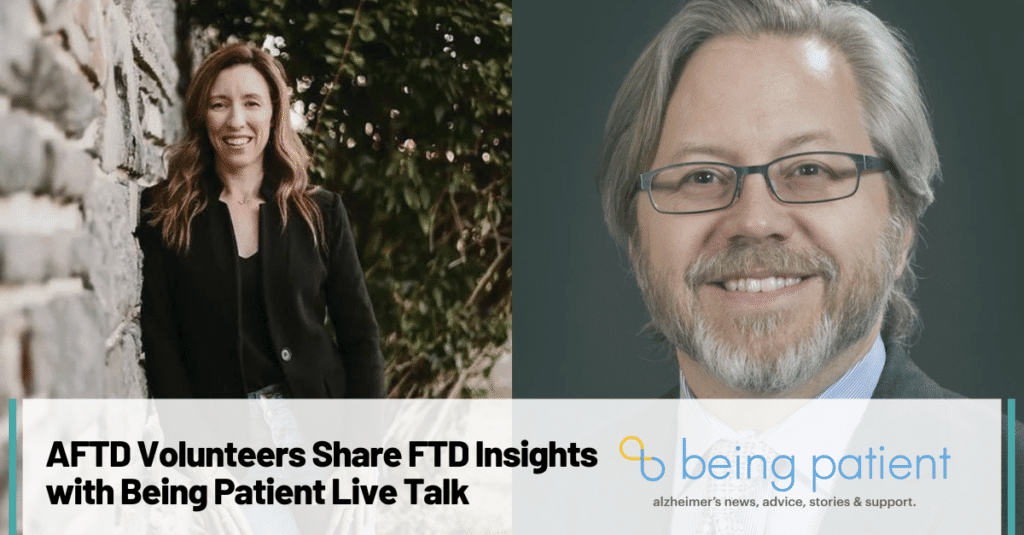Wolontariusze AFTD dzielą się spostrzeżeniami FTD podczas rozmowy na żywo z udziałem pacjenta

Wolontariuszka AFTD Katie Brandt i przewodniczący Medycznej Rady Doradczej AFTD Brad Dickerson zostali przedstawieni w ostatnim wydaniu magazynu Być cierpliwym Rozmowa na żywo. Brandt i dr Dickerson rozmawiali z założycielką Being Patient, Deborah Kan, przekazując informacje na temat FTD i odpowiadając na pytania publiczności.
Doktor Dickerson przedstawił widzom przegląd FTD z medycznego punktu widzenia, wyjaśniając różne cechy tej choroby i jej wpływ na zdiagnozowane osoby. Oprócz opisywania typowych objawów FTD, opowiedział, czym FTD różni się od choroby Alzheimera. Doktor Dickerson przedstawił wgląd w sposób diagnozowania FTD, zwracając uwagę na trudności, jakie często napotykają rodziny i lekarze w postawieniu diagnozy.
„Wielu neurologów mogło spotkać w ciągu swojej kariery jednego lub dwóch pacjentów z FTD lub postępującą afazją” – stwierdziła dr Dickerson. „To rzadka choroba. Jeśli więc nie masz dostępu do specjalisty, ustalenie, czy jest to właściwa diagnoza, czy nie, może być trudne. Wielu pacjentów i ich rodziny będą opowiadać się za próbami uzyskania dostępu do specjalisty. Ale jak wiemy, jest nas za mało.”
Jako była partnerka w opiece nad jej mężem, Mikiem, Brandt podzieliła się spostrzeżeniami na podstawie swoich życiowych doświadczeń z FTD. Opowiedziała, jak u Mike’a w wieku 29 lat zdiagnozowano FTD i jak pojawiły się pierwsze objawy.
„Tak więc, kiedy budujesz swoje życie, spodziewając się, że będziesz w spółce partnerskiej, masz dwa dochody, a potem nagle jedna osoba w spółce nie wydaje się taka sama” – powiedział Brandt. „Mike stał się trochę apatyczny, jeśli chodzi o pracę. Jego produkt pracy nie był wysokiej jakości, do jakiej byli przyzwyczajeni jego klienci. Nie był w stanie wykonać wszystkich zadań; Nagle poczułam się niekomfortowo, zostawiając go samego z naszym synem. Nie miałem więc współrodzica ani osoby generującej dodatkowe dochody”.
Brandt odpowiadał także na pytania widzów dotyczące różnych aspektów podróży FTD. Poruszyła wydarzenia z własnego doświadczenia, takie jak wyjaśnienie synowi diagnozy Mike'a, wizyty u ośmiu lekarzy w celu postawienia diagnozy i decyzja o oddaniu mózgu Mike'a. Brandt mówił także o tym, w jaki sposób partnerzy opiekujący się chorymi i inni członkowie rodziny mogą wspierać bliskich chorych na FTD.
„Dzisiaj nie mamy lekarstwa na te schorzenia, ale mamy lekarstwo na izolację i samotność, które mogą pojawić się wraz z diagnozą” – powiedział Brandt. „Dlatego od razu mówię ludziom, że powinniście porozmawiać ze starszym prawnikiem. Drugim krokiem jest nawiązanie kontaktu ze społecznością związaną z chorobą. Jeśli cierpisz na FTD, skontaktuj się ze Stowarzyszeniem na rzecz Zwyrodnienia Czołowo-skroniowego i znajdź grupę wsparcia.”
Katie Brandt jest wolontariuszką i długoletnią współpracowniczką AFTD. Została nazwana współprzewodniczący Rady Doradczej Narodowej Ustawy o Projektie Alzheimera (NAPA). w 2019 roku i pojawił się w PSA wyprodukowany przez AFTD i Discovery Communications.
Dr Brad Dickerson jest obecnie przewodniczącym Medycznej Rady Doradczej AFTD oraz dyrektorem Oddziału Chorób Czołowo-Skroniowych i Laboratorium Neuroobrazowania Szpitala Ogólnego w Massachusetts. W przeszłości dr Dickerson dzielił się swoimi spostrzeżeniami na temat FTD w: Magazyn MD panelu wideo a ostatnio z Poczta Waszyngtońska.
Według kategorii
Nasze biuletyny
Bądź na bieżąco
Zarejestruj się już teraz i bądź na bieżąco dzięki naszemu biuletynowi, powiadomieniom o wydarzeniach i nie tylko…
